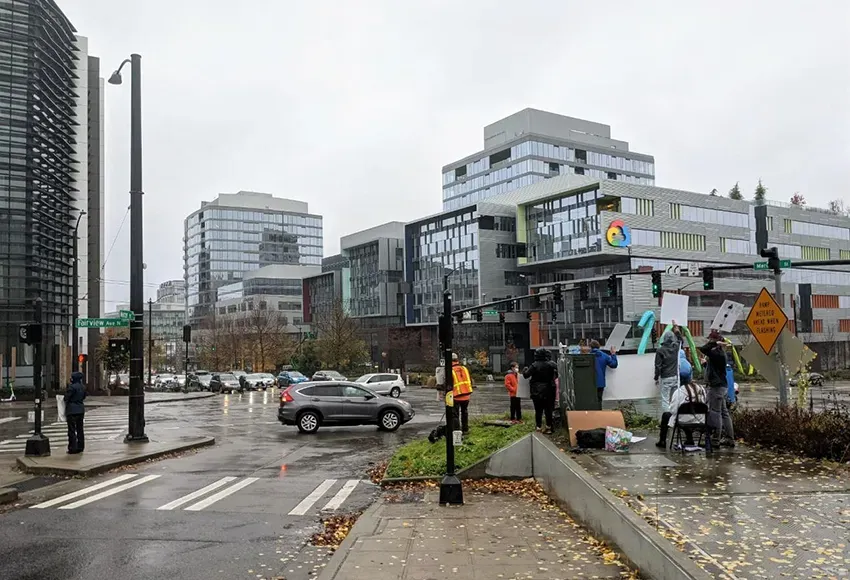T1International's Washington Insulin4All chapter hosted an affordable-insulin protest outside of the manufacturer Novo Nordisk in South Lake Union on World Diabetes Day, November 14.
T1International is a nonprofit organization that started the #Insulin4All movement to remove access barriers to insulin for diabetics. The Washington chapter was started in 2019 by type 1 diabetic Kevin Wren.
Since then, Washington's Insulin4All chapter has been protesting outside of Novo Nordisk in South Lake Union on every World Diabetes Day, which this year marks its 100th anniversary and falls on insulin codiscoverer Frederick Banting's birthday.
In July of 1921, Banting and his colleagues successfully isolated insulin; by January of the following year, it was first injected into a diabetic patient. Knowing how many lives it could save, Banting sold the patent to the University of Toronto for $1 so that it could be mass-produced and distributed. In the process, pharmaceutical company Eli Lilly and Co. was given rights.
"Insulin does not belong to me; it belongs to the world," Banting said.
Price hikes
One hundred years after the discovery of insulin, diabetics are still dying. Over the past thirty years, the three insulin manufacturers – Novo Nordisk, Eli Lilly, and Sanofi – have raised the price of insulin over 1200%, making it unaffordable and inaccessible to diabetics across the country. No other country in this world pays as much for this lifesaving hormone as the United States does.
Currently a vial costs $6 to produce. In 1999 Humalog (made by Eli Lilly) was priced at $21 per vial, but in 2019, it was raised to $322 per vial, even though the formula has not changed at all. On average, diabetics use between two and four vials per month.
Without insulin, type 1 diabetics like Wren can die within 48 to 72 hours. For all types of diabetics who rely on insulin, rationing and not taking it because it's unaffordable leads to complications such as blindness, nerve damage, and kidney failure, among others. For diabetics, going without insulin is not an option – patients must pay the price, or they will die.
"As one of the three insulin manufacturers, [Novo Nordisk reaps] billion of dollars from the sale of insulin alone," Wren said. "Just in Q3 of 2021, they made $574 million from the sale of insulin. The US accounted for 25% of sales, yet we make up only 7% of the global diabetes population."
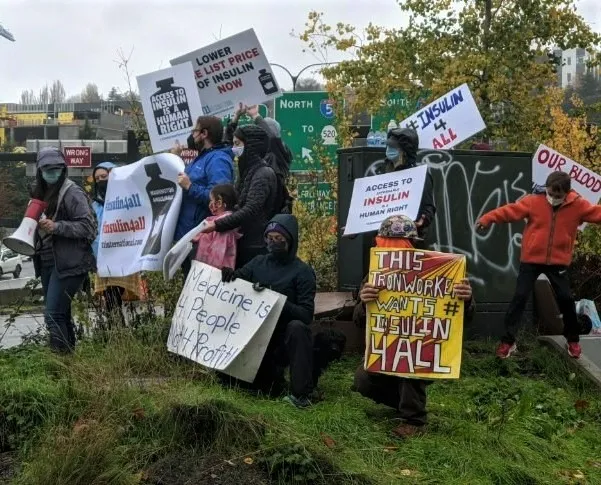
At the protest
"We have lost too many diabetics to pharma greed!" shouted one protestor through a megaphone, followed by a chant honor the diabetic lives that were lost to insulin rationing: "Jeremy Warren Crawford. In memory! Kayla Breanne Davis. In memory! Micah David Fisher. In memory! Jada Renee Louis. In memory! Jesse James Lutgen. In memory! Jesimya Scherer-Radcliff. In memory! Andrew Michael Ramey. In memory! Allen Martin Rivas. In memory! Joshua Andrew Wilkerson. In memory! Antavia Lee Worsham. In memory! Alec Raeshawn Smith. In memory! No more diabetics lost to high insulin prices!"
About a dozen protestors of all ages were in attendance, including two children and an advocacy dog. Some were wearing blue – a color that represents those with diabetes – while others were seen wearing #Insulin4All facemasks.
In the pouring rain, the protestors stood outside chanting and waving to passing cars for an hour while holding signs that said "Insulin4All" and "Access to insulin is a human right." Travis Perkins, an ironworker, came to the protest with his type 1 diabetic wife, who held a sign saying, "Medicine is 4 people, not 4 profit"; his son, who brought a sign that read "You r worth it"; and his own bright red and yellow sign, which said, "This ironworker wants #Insulin4All."
Perkins came to the protest dressed in his ironworker gear, which included a bright orange vest and a hardhat. His son, who was also wearing orange, led a few chants through the megaphone such as, "Insulin for people! Insulin for all!" If there was anyone keeping the crowd's momentum going, it was this kid.
"My wife is a type 1 diabetic, so I know the struggles that go along with getting insulin and just having good blood sugar levels," said Perkins.
Perkins and his family also attended the protest last year; his son mentioned that he wants to come every year. His wife was also involved in an insulin protest outside of Eli Lilly headquarters in Indianapolis.
What does Perkins hope for the future of diabetes? "Just raise awareness," he said. "I educate people at work about it. You know, there's a bunch of stigmas about diabetes – like they didn't take care of themselves, so now that's why they have it.... It's just not true at all."
Lots of cars were lined up at the intersection outside Novo Nordisk, and if drivers weren't simply looking on, they were enthusiastically honking their horns. What appeared to be a bright red EMS SUV with its sirens flashing drove by and honked repeatedly at the protestors. Drivers rolled their windows down to smile, wave, and flash thumbs-up signals. A young adult in a tie-dye sweatshirt drove by honking and cheering in his car.
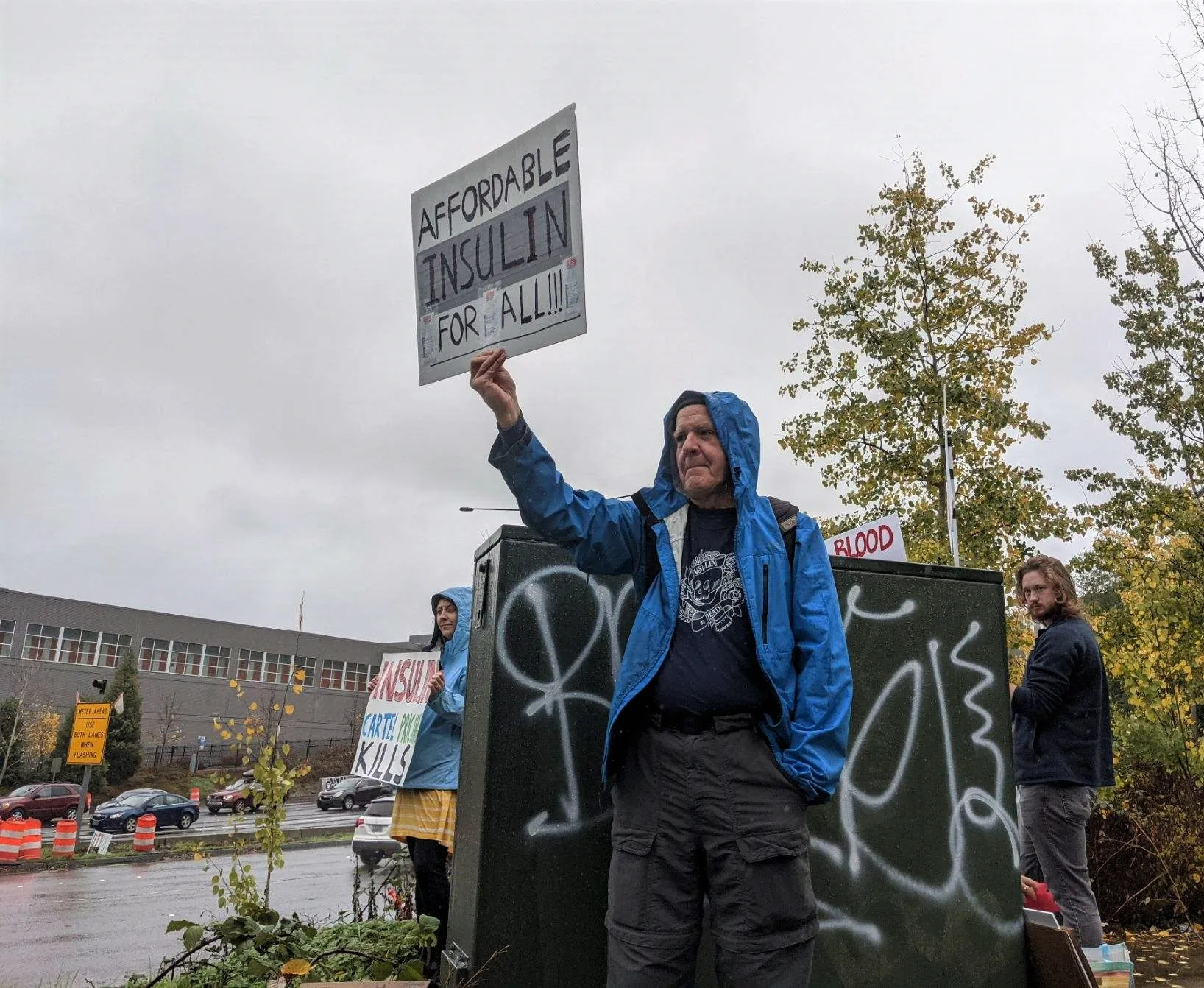
Protesting and advocating
"We've all had that story of rationing," Wren said. "I mean, I'm sure you've seen it – where they switch your prescription and you're at the counter and it's all of a sudden a thousand dollars. What are we supposed to do?"
Wren has been a type 1 diabetic for 20 years; his grandmother, father, and now brother have also been diagnosed with diabetes.
"In 2009, I aged off my parents' insurance, and the cost of my insulin was like, well beyond my rent, so I ended up rationing, and that has led to some complications, and I could've easily died," Wren said. "That's why I'm out [protesting] right now."
Wren advocates for the diabetes community, with hopes of free insulin someday, as well as access to diabetes supplies. A primary focus of his is to assist the uninsured and underinsured so that they can have access to insulin without being forced to pay the full list price.
"Me personally, I help crowdsource insulin for people," Wren said. "I'll usually get messages on Facebook [about] somebody rationing or something like that, and then have to connect them with somebody who has a little extra insulin."
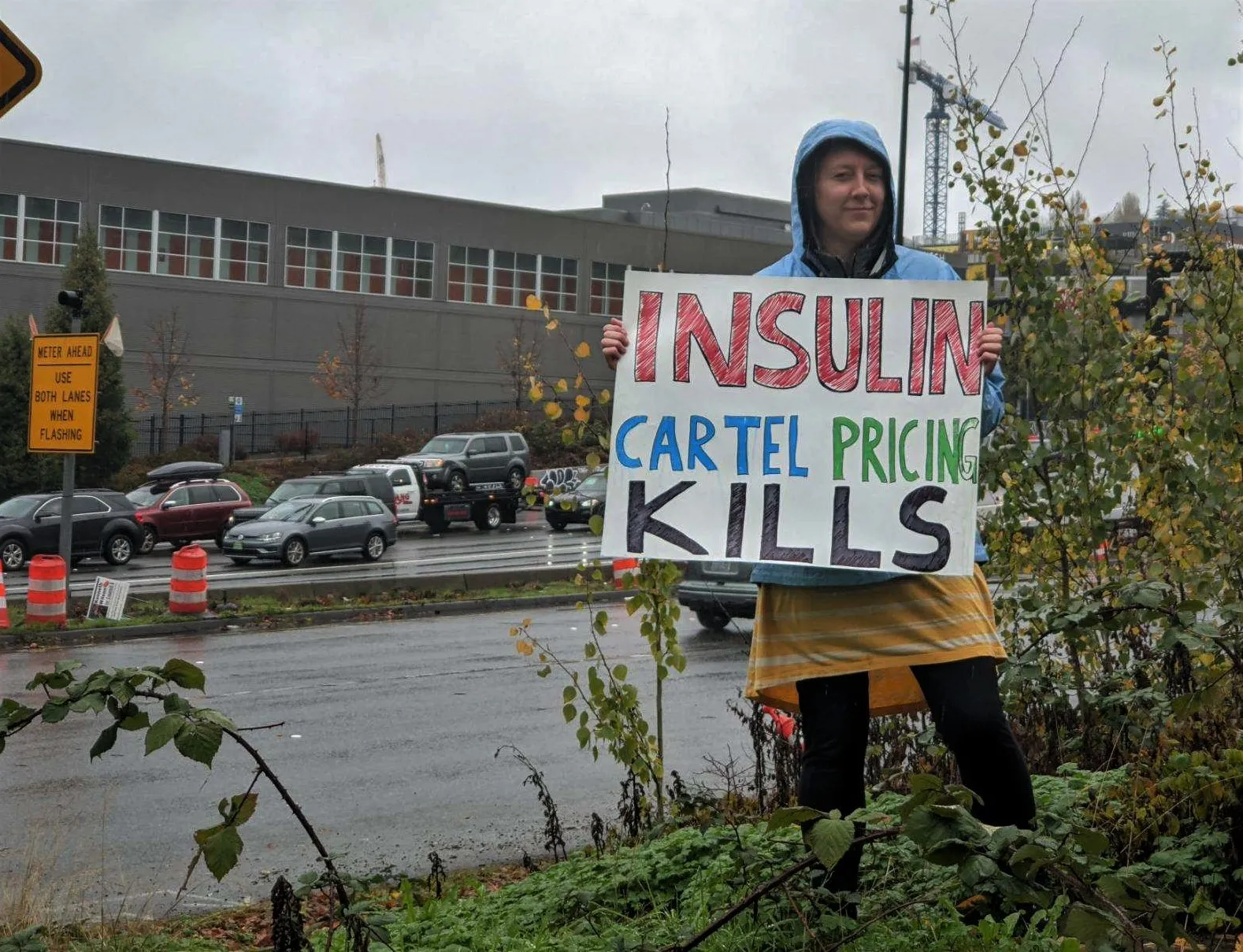
Going to extremes
Diabetics across the United States rely on each other for survival. When they are unable to access or afford not only insulin but also medical supplies, they frequently turn to the diabetes online community, where extra insulin or supplies can be passed on for the sole purpose of keeping each other alive. It's not legal, strictly speaking, although many diabetics justify it since that Big Pharma price gouging that results in the death of diabetics is legal (somehow).
Moreover, diabetics across the country have resorted to traveling to Canada and Mexico in order to obtain insulin for a fraction of its cost in the United States. For most, a round-trip to Canada and the cost of insulin there is far less expensive than simply purchasing it in the US.
Diabetics don't have a choice: they are either forced to pay high prices, which can run up to thousands of dollars for a month's supply, go to these extremes, or die.
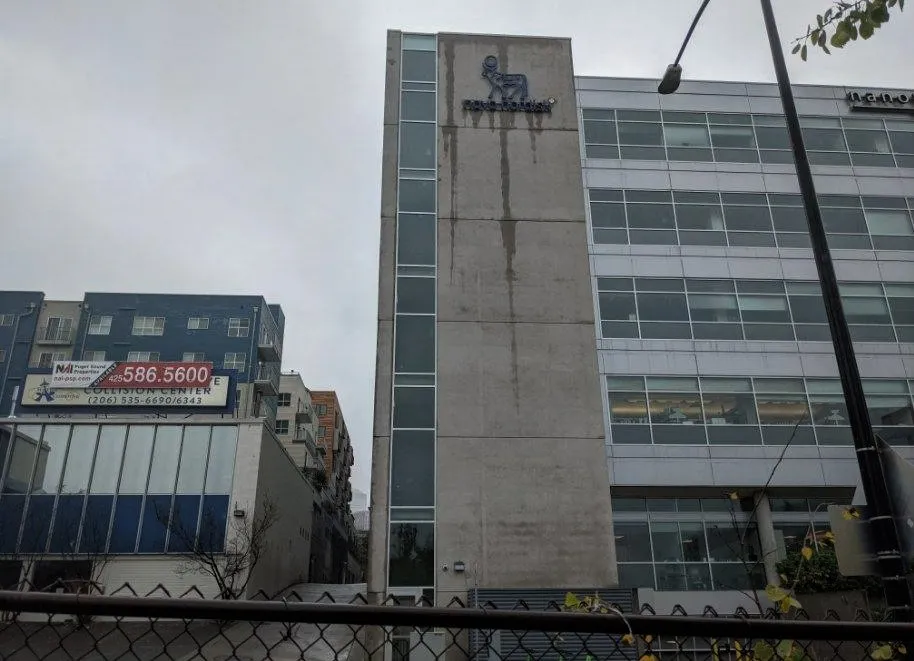
Legislative efforts
Washington's Insulin4All chapter has been making waves with the state legislature when it comes to the insulin crisis that is sweeping the nation. Prior to the 2020 legislative session, Wren met with Rep. Nicole Macri to introduce insulin copay caps (which only apply to those with health insurance). In March of 2020, House Bill 2662, which reduces the total cost of insulin to $100 per 30-day supply, was passed into law. Rep. Macri was one of the sponsors on the bill, and it went into effect on Jan. 1, 2021.
"We successfully lobbied for them to include a person with diabetes to serve on the cost-control board created by the law – a first of its kind," Wren said.
This year, the chapter has been lobbying to lower the copay cap limit to (hopefully) $0. The chapter has also been trying to get technology and supplies covered and include a Kevin's Law provision.
Kevin's Law was created after Ohio native Kevin Houdeshell died in 2014 from rationing his insulin. During the holiday season, Kevin needed a new insulin prescription, but he couldn't get in contact with his doctor. He attempted to get it at the pharmacy but was turned away without a prescription. He began rationing his insulin in hopes of contacting his doctor in a few days, but he died alone in his apartment.
Following his death, his family advocated for emergency prescriptions refill legislation across the United States and since, over 17 states have passed such laws in honor of Kevin.
As for the future of insulin and diabetes supply access in the state of Washington?
"Last year, California passed a bill allowing them to manufacture and distribute generics and biosimilar insulin. We lobbied our elected [officials] to follow their lead to address drug affordability," Wren said. "While insulin was our focus, we also know that drugs are unaffordable for so many, and the market lacks competition. SB 5203 was introduced, and through our testimony, they amended the law to specifically name insulin. It passed, and now we might see a Washington-branded insulin."
To learn more or get involved, visit https://www.t1international.com/usa/


